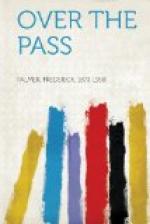“I—I—oh, there are a thousand questions I—” he broke out, desperately.
The muscles of his face tightened. Unconsciously he had leaned forward toward the Doge in his intensity, and his attitude had become that of the Wingfield of the portrait. A lower note of command ran through the misery of his tone.
Jasper Ewold stared at him in a second of scrutiny, at once burningly analytic and reflective. Then he flushed as he had at sight of the figure in the drawing-room doorway. His look plainly said: “How much longer do you mean to harass me?” as if Jack’s features were now no less the image of a hard and bitter memory than those of John Wingfield, Sr. Jack drew back hurt and dumb, in face of this anger turned on himself. At length, the Doge mustered his rallying smile, which was that of a man who carries into his declining years a burden of disappointments which he fears may, in his bad moments, get the better of his personal system of philosophy.
“Come, Mary!” he said, drawing his arm through hers. He became, in an evident effort, a grand, old-fashioned gentleman, making a bow of farewell. “Come, Mary, it’s an early train and we have our packing yet to do.”
This time it was, indeed, dismissal; such a dismissal with polite urgency as a venerable cabinet minister might give an importunate caller who is slow to go. He and Mary started into the hotel. But he halted in the doorway to say over his shoulder, with something of his old-time cheer, which had the same element of pity as his leave-taking on the trail outside of Little Rivers:
“Luck, Sir Chaps!”
“Luck!” Mary called in the same strained tone that she had called to Jack when he went over the pass on his way to New York, the tone that was like the click of a key in the lock of a gate.
XXX
WITH THE PHANTOMS
As Jack left the hotel entrance he was walking in the treadmill mechanics of a prisoner pacing a cell, without note of his surroundings, except of dim, moving figures with which he must avoid collision. The phantoms of his boyhood, bulky and stiflingly near, had a monstrous reality, yet the ghostly intangibility that mocked his sword-thrusts of tortured inquiry. At length his distraction centered on the fact that he and his father were to dine alone that evening.
They dined alone regularly every Wednesday, when Jack made a report of his progress and received a lesson in business. It was at the last council of this kind that John Wingfield, Sr. had bidden his son to bring all questions and doubts to him. Now Jack hailed the weekly function as having all the promise of relief of a surgeon’s knife. Fully and candidly he would unburden himself of every question beating in his brain and every doubt assailing his spirit.
By the time that he was mounting the steps of the house his growing impatience could no longer bear even the delay of waiting on dinner. When he entered the hall he was the driven creature of an impelling desire that must be satisfied immediately.




